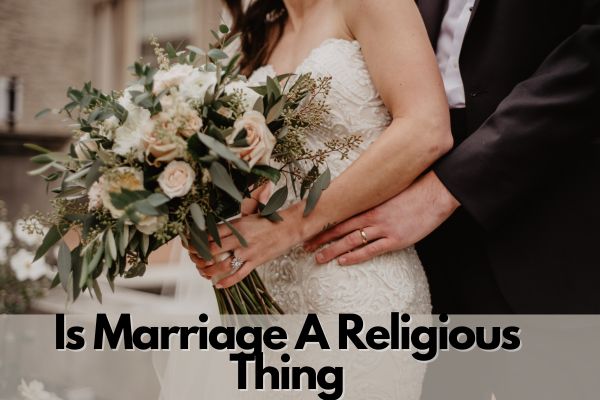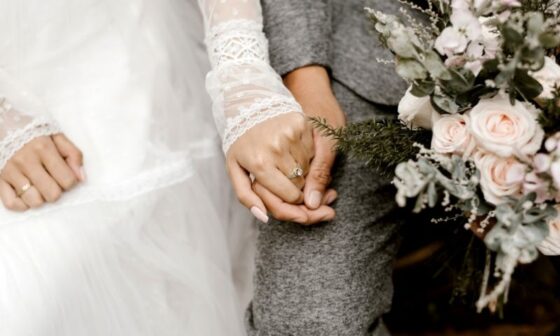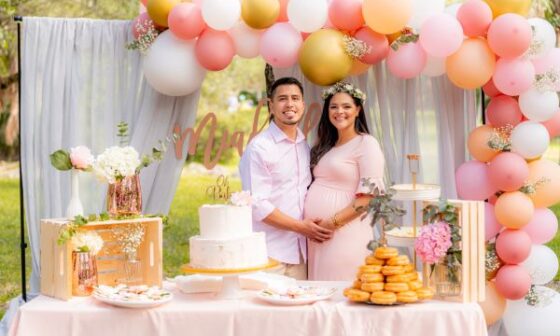Marriage is a profound and culturally significant institution that has been practiced for centuries across various religious and cultural traditions. However, the question arises: Is marriage a religious thing?
This article explores the interplay between marriage and religion, examining historical perspectives, religious viewpoints, and secular and cultural influences.
By delving into the significance of marriage within different belief systems and analyzing contemporary perspectives, we aim to gain a comprehensive understanding of whether marriage is indeed a religious thing.
Is Marriage A Religious Thing (Definition Of Marriage)
Marriage is a legal, social, and cultural union between two individuals, typically recognized by law, in which they establish a lifelong partnership and commit to sharing their lives, responsibilities, and resources. It is a formalized and socially accepted institution that signifies a deep level of commitment, love, and companionship between spouses.
Marriage is traditionally characterized by legal rights and obligations, such as inheritance, property ownership, and decision-making authority, and it often involves religious or ceremonial rituals that vary across different cultures and belief systems.
The primary purpose of marriage is to create a stable foundation for a family unit, provide emotional support, and foster the continuation of the human species through procreation. However, the understanding and interpretation of marriage have evolved over time, reflecting societal changes, cultural practices, and legal frameworks.
Origins Of Marriage
The origins of marriage can be traced back to ancient times, and its exact beginnings are difficult to pinpoint due to the absence of written records from those early periods. However, anthropological and historical evidence provides insights into the origins and development of this institution.
1. Evolutionary Perspective
From an evolutionary perspective, marriage is believed to have emerged as a way to ensure the survival and reproductive success of human beings.
The formation of long-term pair bonds between males and females helped create stable environments for raising children and provided a mechanism for the division of labor, with one partner primarily engaging in hunting or gathering, while the other focused on childcare and domestic tasks.
2. Cultural And Social Influences
As societies evolved, cultural and social influences began shaping the institution of marriage. The practice of marriage varied widely across different civilizations, reflecting their unique beliefs, customs, and socioeconomic structures. For example:
3. Ancient Mesopotamia
In ancient Mesopotamia, marriage was primarily an economic arrangement between families, emphasizing the transfer of property and the consolidation of alliances.
4. Ancient Egypt
In ancient Egypt, marriage was seen as a way to maintain social order and preserve lineage. Monogamy was prevalent, and marriages often involved elaborate ceremonies and contractual agreements.
5. Ancient Greece And Rome
Marriage in ancient Greece and Rome had both religious and legal aspects. These societies recognized various forms of marriage, including monogamy, polygamy, and concubinage, with the institution serving social, economic, and political purposes.
6. Religious Influence
Religion has had a significant impact on the institution of marriage throughout history. Many religious traditions have incorporated marriage as a sacred covenant or sacrament. For example:
7. Judaism
In Judaism, marriage is considered a holy union blessed by God and is seen as a way to fulfill the commandment to be fruitful and multiply.
8. Christianity
In Christianity, marriage is regarded as a sacred union ordained by God, symbolizing the relationship between Christ and the Church.
9. Islam
In Islam, marriage is highly valued and considered a moral and religious duty, providing a framework for companionship, love, and procreation.
Overall, the origins of marriage can be attributed to a combination of evolutionary, cultural, and religious factors. While its specific practices and significance have evolved over time, marriage continues to be a fundamental institution in human societies, serving various purposes, including companionship, procreation, social stability, and the expression of love and commitment between partners.
Influence Of Religion On Marriage Traditions
Religion has had a profound influence on marriage traditions throughout history. It has shaped the understanding, rituals, and practices associated with marriage in various ways. Here are some key ways in which religion has influenced marriage traditions:
1. Sacred Covenant
In many religious traditions, marriage is considered a sacred covenant or sacrament. It is seen as a spiritual bond established by divine sanction. This belief elevates the significance of marriage beyond a mere social contract and emphasizes its spiritual and moral dimensions.
Religious teachings often emphasize the importance of fidelity, commitment, and mutual support within the marital relationship.
2. Rituals and Ceremonies
Religious traditions have introduced specific rituals and ceremonies associated with marriage. These rituals often reflect the beliefs and values of the faith. They can include prayers, blessings, readings from sacred texts, the exchange of vows, and the presence of religious leaders or officiants.
These ceremonies provide a sacred and communal context for the couple to publicly declare their commitment to each other and seek the blessings of higher powers.
3. Moral And Ethical Guidelines
Religions provide moral and ethical guidelines that inform the expectations and responsibilities within a marital relationship. These teachings may address issues such as fidelity, love, respect, forgiveness, and the importance of family values.
Religious texts and teachings often serve as a source of guidance for couples, helping them navigate challenges and maintain a harmonious and fulfilling marriage.
4. Procreation And Family
Many religious traditions emphasize the importance of procreation and the formation of families within the institution of marriage. The belief in the sacredness of life and the role of marriage in the continuation of the human species is often emphasized.
Religious teachings may encourage couples to bear and raise children, providing a spiritual and moral foundation for the family unit.
5. Social And Cultural Norms
Religion often influences the social and cultural norms surrounding marriage. It may dictate who is eligible to marry, prescribe rules for interfaith or inter-caste marriages, and define the roles and responsibilities of spouses within the context of their religious community. These norms and expectations shape the behavior, customs, and traditions observed within religious communities.
6. Legal And Institutional Recognition
In many societies, religious institutions play a crucial role in the legal recognition of marriages. Religious ceremonies and officiants are often recognized as legally valid, and religious laws may govern marriage and divorce proceedings. This close association between religion and the legal aspects of marriage further strengthens the influence of religious beliefs and practices.
It is important to note that the extent of religious influence on marriage traditions can vary across different cultures, denominations, and individual beliefs. While some individuals adhere strictly to religious teachings and traditions, others may adopt a more secular or personalized approach to marriage.
Nonetheless, religion continues to be a significant force shaping marital customs, values, and expectations for many people around the world.
Religious Perspectives On Marriage In Christianity
In Christianity, marriage is considered a sacred union blessed by God. It is viewed as a lifelong commitment between a man and a woman, symbolizing the relationship between Christ and the Church. Here are some key perspectives on marriage within Christianity:
1. Sacramental View
Many Christian denominations consider marriage to be a sacrament, a visible sign of God’s grace. It is believed that God is present in the marital union, and the couple receives divine blessings and strength to fulfill their marital vows.
2. Biblical Teachings
Christian teachings on marriage are often derived from the Bible. The Book of Genesis describes marriage as the union of a man and a woman, intended for companionship, procreation, and mutual support. The Apostle Paul’s writings emphasize the importance of love, respect, and mutual submission within the marital relationship.
3. Marriage As A Covenant
Christians often view marriage as a covenant between the couple and God. It is seen as a solemn promise to love, honor, and cherish each other, reflecting the covenantal relationship between God and His people. This understanding emphasizes the enduring nature of marriage and the commitment to work through challenges and grow together spiritually.
Religious Perspectives On Marriage In Islam
In Islam, marriage is highly valued and regarded as a moral and religious duty. It is seen as a means of fulfilling one’s religious obligations and establishing a harmonious and loving partnership. Here are key perspectives on marriage within Islam:
1. Importance Of Marriage
Islam considers marriage a recommended act, and Prophet Muhammad encouraged believers to marry. Marriage is seen as a way to fulfill human needs, promote social stability, and protect individuals from engaging in sinful behavior.
2. Contractual Nature
Islamic marriage is based on a contractual agreement known as the “Nikah.” The contract outlines the rights and responsibilities of the spouses, including matters such as dowry, financial support, and the treatment of wives. It is conducted in the presence of witnesses and an Islamic authority.
3. Partnership And Companionship
Islam emphasizes the importance of love, mercy, and companionship within the marital relationship. Spouses are considered partners who support and help each other in fulfilling their religious obligations, raising children, and building a pious and harmonious family.
Religious Perspectives On Marriage In Hinduism
In Hinduism, marriage is considered a sacred and significant event, seen as a spiritual and social union between a man and a woman. Here are key perspectives on marriage within Hinduism:
1. Religious Duty
Hindu scriptures emphasize the importance of marriage as a duty and a means to fulfill one’s obligations and responsibilities. It is believed that marriage allows individuals to progress spiritually, fulfill their earthly duties, and pursue the four goals of life (Dharma, Artha, Kama, and Moksha).
2. Religious Rituals And Ceremonies
Hindu weddings are elaborate and involve various rituals and customs. These rituals are guided by religious texts and priests and symbolize the union of two souls, families, and the blessing of the deities. They include rituals such as the exchange of garlands, the circling of the sacred fire, and the recitation of Vedic hymns.
3. Concept of Samskaras
Hinduism recognizes marriage as one of the important samskaras (sacraments) that mark significant milestones in a person’s life. It is believed that through marriage, individuals undergo a transformative process, purify their souls, and strengthen their commitment to each other and to their religious and social responsibilities.
Secular Perspective On Marriage
From a secular perspective, marriage is primarily seen as a civil institution rather than a religious one. Secularism refers to the separation of religion and state, where the government does not endorse or promote any particular religious belief or practice.
Here are key aspects of the secular perspective on marriage:
1. Legal And Social Contract
Secular societies recognize marriage as a legal contract between two individuals, irrespective of their religious beliefs or affiliations. The legal framework provides rights, responsibilities, and protections for married couples, including property rights, inheritance, taxation, and access to benefits such as healthcare and social security.
2. Equality And Individual Rights
Secular perspectives on marriage prioritize the principles of equality and individual rights. Secular societies advocate for gender equality and the freedom of choice in selecting a partner, regardless of gender or sexual orientation. Secularism promotes the idea that marriage should be accessible to all consenting adults who wish to enter into a committed partnership.
3. Focus On Love and Companionship
Secular views on marriage often emphasize the emotional bond of love, companionship, and mutual support between partners. Marriage is seen as a personal choice based on the desire for emotional connection, shared values, and the commitment to build a life together.
4. Separation Of Church And State
Secularism upholds the principle of separating religious beliefs and practices from state institutions. This means that while individuals are free to incorporate their religious beliefs into their marriage, the legal recognition of marriage is not dependent on religious rites or blessings. Secular societies aim to provide a neutral and inclusive approach to marriage that respects the diversity of beliefs and non-beliefs within the population.
5. Non-Religious Ceremonies and Commitments
Secular perspectives on marriage recognize and accommodate non-religious ceremonies and commitments. Couples may choose to have civil ceremonies conducted by government officials or celebrants, focusing on personal vows, declarations, and the exchange of rings.
Alternative forms of commitment, such as civil partnerships or domestic partnerships, may also be recognized for couples who prefer not to engage in a traditional marriage.
6. Focus On Personal Choice and Autonomy
Secularism places importance on personal autonomy and the freedom to make individual choices. It respects the right of individuals to decide whether or not to marry and whom to marry, without external religious influences or obligations.
Cultural Perspectives On Marriage
Cultural perspectives on marriage vary significantly across different societies and cultures worldwide. These perspectives are shaped by cultural norms, values, traditions, and historical practices. Here are some key cultural perspectives on marriage:
1. Arranged Marriages
Arranged marriages are prevalent in many cultures, particularly in South Asia, the Middle East, and parts of Africa. In these societies, families play a significant role in selecting marriage partners for their children based on factors such as social status, family reputation, economic considerations, and compatibility. Arranged marriages often involve the participation of family members, matchmakers, or community elders who facilitate the process.
2. Love Marriages
In contrast to arranged marriages, love marriages emphasize the freedom of individuals to choose their own life partners based on mutual love, attraction, and compatibility. Love marriages are common in many Western cultures and societies that have undergone significant social changes. In these marriages, the couple’s personal feelings and emotional connection are central to the decision to marry.
3. Polygamy And Polygyny
Some cultures, particularly in parts of Africa, the Middle East, and certain indigenous communities, practice polygamy or polygyny. Polygamy refers to the practice of having multiple spouses, whereas polygyny specifically refers to a man having multiple wives. Polygamous marriages may be influenced by cultural, religious, or traditional norms and are often associated with issues of gender roles, power dynamics, and familial structures.
4. Matriarchal And Matrilineal Societies
In certain cultures, such as some indigenous communities in Africa, Asia, and the Americas, marriage and family structures are influenced by matriarchal or matrilineal traditions. In these societies, descent, inheritance, and social status are passed through the female line. Marriage customs may reflect this matrilineal emphasis, with women holding important roles and decision-making power in the family unit.
5. Dowry And Bride Price
Some cultures practice the exchange of financial or material resources as part of the marriage process. Dowry refers to the transfer of wealth or assets from the bride’s family to the groom or his family, while a bride price involves the payment of money or goods by the groom or his family to the bride’s family. These practices are found in various parts of Asia, Africa, and certain indigenous communities and serve as social and economic transactions associated with marriage.
6. Ceremonial Traditions
Cultural perspectives on marriage often involve unique ceremonial traditions and rituals that vary across different regions and ethnic groups. These rituals may include engagement ceremonies, wedding feasts, traditional attire, symbolic gestures, religious rites, and the involvement of community members. Ceremonial traditions reflect cultural values, customs, and the significance attached to marriage within a particular cultural context.
Relationship Between Religion and Marriage
The relationship between religion and marriage is complex and multifaceted. Religion has played a significant role in shaping the understanding, rituals, and practices associated with marriage in many societies throughout history.
Here are some key aspects of the relationship between religion and marriage:
1. Religious Significance
Many religions view marriage as a sacred institution and attribute spiritual significance to it. Marriage is often considered a divine covenant or sacrament, symbolizing the relationship between believers and the divine.
Religious teachings provide guidance on the purpose of marriage, the roles and responsibilities of spouses, and the moral and ethical principles that should govern the marital relationship.
2. Moral And Ethical Framework
Religion often provides a moral and ethical framework for marriage. Religious teachings establish guidelines for marital behavior, emphasizing fidelity, love, respect, compassion, and mutual support.
Religious texts and traditions offer moral guidance for couples, helping them navigate challenges and conflicts, and promoting virtues that contribute to the well-being of the marital relationship.
3. Rituals And Ceremonies
Religious traditions introduce specific rituals and ceremonies associated with marriage. These rituals may include prayers, blessings, readings from sacred texts, the exchange of vows, and the involvement of religious leaders or officiants.
These ceremonies provide a sacred and communal context for the couple to publicly declare their commitment to each other and seek the blessings of their religious community.
4. Social and Cultural Norms
Religion often influences the social and cultural norms surrounding marriage. Religious teachings may dictate who is eligible to marry, prescribe rules for interfaith or inter-caste marriages, and define the roles and responsibilities of spouses within the context of the religious community.
Religious communities may have specific expectations and customs related to courtship, engagement, wedding celebrations, and family life.
5. Legal And Institutional Recognition
In many societies, religious institutions have historically played a role in the legal recognition of marriages. Religious ceremonies and officiants are often recognized as legally valid, and religious laws may govern marriage and divorce proceedings. However, the extent of this legal recognition varies across different countries and legal systems.
6. Influence On Family And Society
Religion’s influence on marriage extends beyond the individual couple. Religious teachings often emphasize the importance of the family unit and the role of marriage in procreation, child-rearing, and the transmission of religious and cultural values to future generations.
Religious communities may have specific views on gender roles, family structure, and the preservation of moral values within society.
Conclusion
The question of whether marriage is a religious thing is multifaceted and nuanced. While religion has played a significant role in shaping and defining marriage traditions, it is essential to recognize that marriage has evolved to encompass a broader range of cultural, legal, and secular dimensions.
While religious perspectives on marriage continue to hold influence, contemporary society witnesses a growing diversification in the forms of commitment and partnership. As societal attitudes evolve, the boundaries between religious and non-religious aspects of marriage become increasingly blurred.
Ultimately, whether one perceives marriage as inherently religious or as a cultural and legal institution depends on personal beliefs and cultural contexts. By examining the various dimensions of marriage, we can appreciate the rich tapestry of influences that shape this universal human institution.







